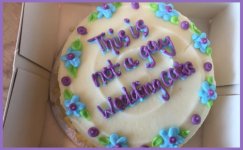But I disagree that a wedding cake is the expression of anyone other than the couple themselves. As you noted yourself, couples spend a great deal of time and attention to choosing their cake so that it is exactly as THEY want it to be.
The baker - while hopefully talented - is not (and should not be) expressing himself in someone else's cake. He should be using his skill to execute THEIR expression.
How would you apply that to commissioned "traditional" art forms, where the patron chooses the subject? Could an atheist painter be sued for refusing to take a commission to create a religious image?
That's a good question, and I was considering it earlier. I was particularly thinking about portrait painters as an example. Could they turn down a commission to paint a gay couple? And to be honest, I am still chewing on it.
My first thought is that most "traditional" artists are not businesses in the same way a bakery is. An artist may display their pieces in a gallery for sale, but those will be clearly examples of the artist's personal expression because they will be already completed pieces that a buyer could buy or reject.
A commission, otoh, would entail an agreement with the customer to paint the customer's choice of subject. I think your example would be relatively easy - the artist could reject the commission based on religious icons not being within his speciality... just like a cake baker could reject an order for cookies because he doesn't normally bake cookies. Cakes and cookies are both bakery items, but only one is within the baker's area of speciality.
But if a portrait artist specializes in portraits of couples, could said artist refuse to paint a gay couple? IF we accept the argument that the artist's product is necessarily "expression" by virtue of the fact that it is "art", then the artist cannot be compelled to produce the portrait.
But given that his business is to produce portraits in exchange for money, can he discriminate against the gay couple? I'd think not.
But, because a portrait of a gay couple is readily identifiable as an "expression" of a gay couple (and potentially construed as an endorsement of gay couples) in a way that a cake can never be, would requiring the artist to paint the portrait be an example of compelling "expression" against the artist's personal beliefs.
At this point, I would tend to side with the portrait artist in this case. S/he should not be compelled to paint the portrait because the finished product is clearly identifiable as celebrating a gay couple. As much as I would personally disagree with the artist's position, I think I would have to support it in principle.
The cake baker, on the other hand... a cake is a cake is a cake. It is not, in and of itself, identifiable as "gay" or "straight", so the baker's objection has no basis other than discrimination against the potential customers.

